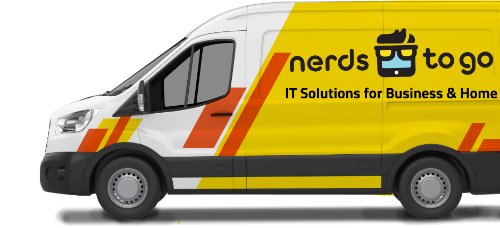
Cloud Services
The cloud has transformed how businesses operate by providing flexible, scalable, and cost-effective solutions that eliminate the need for maintaining expensive on-site hardware. Simply put, the cloud allows you to access powerful software, data storage, and computing services over the internet, rather than relying on physical servers and equipment at your business. Whether you're looking to enhance productivity with tools like Microsoft 365 or migrate your entire IT infrastructure to the cloud, NerdsToGo is here to guide you through the process.
Solutions We Provide:
Cloud Infrastructure Setup & Management:
- Build and manage your cloud infrastructure, ensuring it is secure, scalable, and reliable.
- Store data, run applications, and scale up quickly during busy periods, creating a cloud environment tailored to your business's specific needs.
- Avoid the costs of buying and maintaining physical servers while keeping your data accessible anytime, from anywhere, with top-tier security protocols.
Microsoft 365 and Google Workspace Setup & Management:
- Handle the full setup and configuration of Microsoft 365 and Google Workspace, including migrating existing data, email accounts, and documents to the cloud.
- Provide ongoing support and training, ensuring your team can make the most of features like cloud storage, real-time collaboration, and advanced communication tools.
- Improve productivity, communication, and collaboration by enabling your team to work from anywhere, on any device, with access to the same files and applications.
Cloud Migration Services:
- Plan and execute a tailored migration strategy that matches your specific needs, whether moving from physical servers to the cloud or transitioning between cloud providers.
- Minimize downtime, secure your data, and integrate new cloud services with existing systems for those preferring a hybrid approach.
- Reduce reliance on physical hardware, lower costs, and benefit from increased flexibility and scalability that cloud computing offers.
VOIP Solutions:
- Implement VOIP phone systems tailored for your business, replacing traditional phone lines with a cost-effective, feature-rich solution.
- Provide setup, support, and training so your team can make the most of VOIP technology.
- Enjoy better call quality, lower costs, and advanced features like call forwarding, voicemail to email, and video conferencing—all managed through the cloud.
Why You Should Considering Moving to the Cloud:
- Cost Savings: By shifting to the cloud, you eliminate the need for expensive hardware and ongoing maintenance. Instead, you pay for what you use, turning large capital expenditures into predictable operational costs.
- Flexibility & Scalability: The cloud allows your business to quickly scale resources up or down based on demand. Whether you need more storage, computing power, or additional services, the cloud can adapt to your needs without requiring new hardware.
- Enhanced Security & Accessibility: Cloud providers offer substantial security features, including data encryption, automated backups, and disaster recovery solutions. Additionally, they are responsible for the physical security of the data centers, ensuring protection from unauthorized access, natural disasters, and other threats. This means your data is stored securely and accessible from anywhere, enabling your team to work safely from any location.
Our cloud services are designed to educate and assist you at every step, ensuring a seamless transition and maximum benefit from cloud technologies.
Contact us today to learn more about our cloud services
Frequently Asked Questions
Q1: What is the cloud?
A1: The cloud is a way of using powerful computing resources over the internet instead of relying on physical servers or hardware in your office. Think of it like renting space and tools online—whether it’s for storing files, running software, or accessing various services. Instead of having to buy and maintain expensive equipment, you use the cloud to access what you need from anywhere with an internet connection. It’s flexible and scalable, meaning you can adjust your resources as needed, and it helps keep your data secure and accessible without the hassle of managing physical infrastructure.
Q2: What is a cloud migration?
A2: Cloud migration is the process of moving your data, applications, and IT resources from on-site servers or traditional systems to cloud-based platforms. Essentially, it involves transferring everything you currently manage locally to the cloud, where it can be accessed and managed over the internet. This process can include moving files, databases, software applications, and other digital assets to cloud services. The goal of cloud migration is to take advantage of the cloud’s flexibility, scalability, and cost-effectiveness, allowing you to access and manage your resources from anywhere, without needing to maintain physical hardware.
Q3: What is cloud-to-cloud migration?
A3: Cloud-to-cloud migration is the process of moving data, applications, or services from one cloud platform to another. This might be necessary if you're switching cloud providers or integrating different cloud services to improve performance or reduce costs. For example, if your business currently uses one cloud service for data storage but wants to switch to another provider with better features or pricing, you would perform a cloud-to-cloud migration. The process involves transferring your information from the existing cloud environment to the new one, ensuring minimal disruption and maintaining data integrity throughout the transition.
Q4: What is cloud infrastructure?
A4: Cloud infrastructure refers to the collection of virtual resources provided over the internet to support your business’s IT needs. Instead of relying on physical servers and hardware in your office, cloud infrastructure uses online services to deliver computing power, storage, and networking. It includes things like virtual machines, data storage, and networking resources, all managed by cloud service providers. This setup allows businesses to scale their resources up or down as needed, access their data and applications from anywhere, and avoid the costs and maintenance associated with physical hardware. Essentially, cloud infrastructure provides the backbone for running applications and storing data in a flexible, scalable, and cost-effective way.
Q5: How does NerdsToGo ensure the security of my cloud environment?
A5: NerdsToGo ensures the security of your cloud environment in the same way we protect on-premise systems: by using strong security measures such as data encryption, strict access controls, and continuous threat monitoring. We partner with leading cloud service providers to leverage their advanced security features, including secure data centers and real-time threat detection. Our team also regularly reviews and updates security protocols to safeguard your data from unauthorized access and cyber threats, maintaining the highest standards of protection both in the cloud and on-site.
Q6: What are Microsoft 365 and Google Workspace, and how can they help my business?
A6: Microsoft 365 and Google Workspace are cloud-based services that provide a suite of productivity tools designed to enhance how your business operates. Microsoft 365 includes popular applications like Word, Excel, Outlook, and Teams, while Google Workspace offers Gmail, Google Docs, Sheets, and Meet. These tools are accessible online, allowing your team to use them from anywhere with an internet connection. Even if you’re using desktop applications, they integrate seamlessly with the cloud, enabling access to cloud files, real-time collaboration, and synchronization across devices. This combination of cloud and desktop functionality makes it easier to stay connected and productive, whether your team is working in the office or remotely. By leveraging these cloud services, you can streamline operations, enhance collaboration, and improve overall efficiency without needing to manage physical servers or extensive software installations.
Q7: What is a VOIP phone system?
A7: A VOIP (Voice Over Internet Protocol) phone system allows businesses to make and receive calls using the internet instead of traditional phone lines. By converting voice signals into digital data, VOIP enables communication over an existing internet connection, eliminating the need for physical phone lines. VOIP provides advanced features that traditional phone systems often lack, such as call forwarding, voicemail-to-email, auto attendants, and video conferencing. It also offers flexibility, allowing employees to make calls from anywhere with an internet connection, which is ideal for businesses with remote or mobile teams.
Contact us today to get started

NerdsToGo
-
Small Business IT Experts
-
IT Consulting and Troubleshooting
-
Locally Owned and Operated
-
On-Site and Remote Support


Hear From Our Customers





